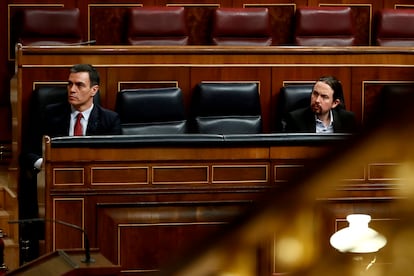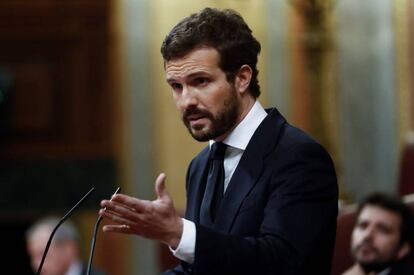Spanish PM secures congressional support to extend state of alarm
Although opposition parties heavily criticized Pedro Sánchez for his handling of the coronavirus crisis, they voted in favor of keeping the emergency measures in place until April 12

The state of alarm in Spain, which has confined the population to their homes since March 15 in a bid to slow the spread of the coronavirus, will continue until April 12. This was confirmed last night by the Congress of Deputies, when the measure proposed by Prime Minister Pedro Sánchez of the Socialist Party (PSOE was supported by both right-wing and left-wing parties, with the abstention of pro-independence groups such as the Catalan Republican Left (ERC).
During the debate that preceded the vote, the prime minister insisted that the country had taken the most restrictive and toughest measures in the face of an epidemic that shows no signs of abating, and called for “time, unity and loyalty” from other parties. Despite offering Sánchez his support, the leader of the main opposition Popular Party (PP), Pablo Casado, harshly criticized the prime minister for his handling of the crisis, which has so far killed 3,643 people and left nearly 50,000 infected, according to the latest figures.
Either we stop the country, or we will end up with no countryGabriel Rufián, congressional spokesperson for the Catalan Republican Left
The debate over extending the state of alarm played out to a near-empty chamber on Wednesday evening, with just 43 deputies present in the 350-seat chamber. A number of high-profile politicians have been confirmed to have the SARS-CoV-2 coronavirus, including Deputy Prime Minister Carmen Calvo, whose diagnosis was confirmed yesterday after she had been in hospital for several days with respiratory issues.
During the session in Congress, Sánchez set out the large number of measures, plans and actions that have been put in place until now, and on several occasions called on the other political parties as well as society for support in facing this never-before-seen crisis. “We need time to adapt the health system and to develop a vaccine for the crisis,” he said.
Sánchez laid out three basic objectives: to prioritize the protection of the most vulnerable, to protect health workers as much as possible, and to protect the entire population by combining general measures with basic personal hygiene habits.

The prime minister repeated the invitation that he conveyed to Spain’s regional leaders during two video conference meetings he has held with them over the last 10 days: “Let’s work together,” he said. “Let us think about the sick and their families. Think about the concern of seniors and the most vulnerable as the pandemic spreads. Think about the health workers and their sleepless nights. Let’s banish any small-minded or selfish thoughts.”
PP leader Pablo Casado, meanwhile, repeated his total support for the government, which is a minority coalition led by the PSOE with the support of leftist Unidas Podemos. But he criticized the administration for not knowing how to use the greatest powers ever granted to a Spanish prime minister since the country returned to democracy toward the end of the 1970s.
“We have given you all that you asked of us, maximum powers, but the effectiveness has been minimal,” he said to Sánchez during the debate, in reference to the state of alarm. “This is not going well. What have you done to efficiently exercise your single control?”
Casado also called for official flags to fly at half mast and that plans be made for a state funeral for the victims, as well as the creation of a monument to commemorate the dead.
We have given you all that you asked of us, maximum powers, but the effectiveness has been minimalPopular Party leader Pablo Casado
The president of the far-right Vox party, Santiago Abascal – who himself was infected with the coronavirus but has since recovered – aimed the same criticism at the prime minister and Deputy Prime Minister Pablo Iglesias of Unidas Podemos, who, he said, had done everything “too late and badly.” Abascal warned the prime minister that his party could withdraw its backing. “If you don’t take advantage of these 15 days to combat the health threat and avoid economic ruin, you will not count on the support of our group again,” he said.
Sánchez’s coalition government does not count on a working majority in Congress, and he needs votes from other parties to pass legislation. The coronavirus crisis marks the first time that opposition parties such as the PP and Vox have offered any kind of support for the left-wing administration.
During Wednesday’s debate, the spokesperson for Podemos, Pablo Echenique, suggested that if the situation in Spain worsens, it could be prudent to restrict yet further the movement of citizens, something that was backed by the spokesperson for the small leftist Más País party, Íñigo Errejón. “We need to take the urgent decision to shut the country down, with stricter confinement, so that this doesn’t last so long,” he argued. His position was supported by several other small groups.
Under the state of alarm, Spaniards are only permitted to leave their homes under certain conditions, such as to purchase food and medication, and to get to their jobs if they cannot work from home.
Gabriel Rufián, the congressional spokesperson for the ERC, argued that now is not the time for political battles but rather to beat the virus. His party, along with other pro-Catalan independence groups such as Together for Catalonia and the CUP, and pro-Basque independence party EH Bildu, abstained in yesterday’s vote. All of these parties voiced their support for stricter confinement measures. “Either we stop the country, or we will end up with no country [...],” Rufián said in Congress. “We need to toughen the confinement conditions with great zeal.” The pro-independence parties and Más País also demanded greater involvement from banks, employer associations and large firms to help bring about the end of the crisis.
English version by Simon Hunter.
Tu suscripción se está usando en otro dispositivo
¿Quieres añadir otro usuario a tu suscripción?
Si continúas leyendo en este dispositivo, no se podrá leer en el otro.
FlechaTu suscripción se está usando en otro dispositivo y solo puedes acceder a EL PAÍS desde un dispositivo a la vez.
Si quieres compartir tu cuenta, cambia tu suscripción a la modalidad Premium, así podrás añadir otro usuario. Cada uno accederá con su propia cuenta de email, lo que os permitirá personalizar vuestra experiencia en EL PAÍS.
¿Tienes una suscripción de empresa? Accede aquí para contratar más cuentas.
En el caso de no saber quién está usando tu cuenta, te recomendamos cambiar tu contraseña aquí.
Si decides continuar compartiendo tu cuenta, este mensaje se mostrará en tu dispositivo y en el de la otra persona que está usando tu cuenta de forma indefinida, afectando a tu experiencia de lectura. Puedes consultar aquí los términos y condiciones de la suscripción digital.








































